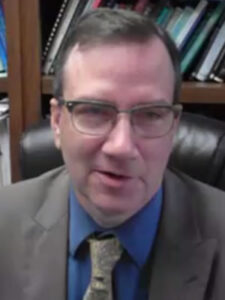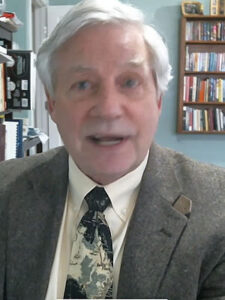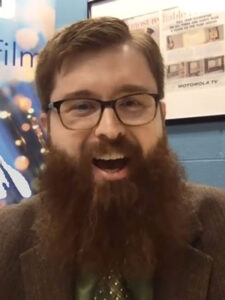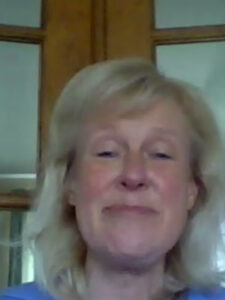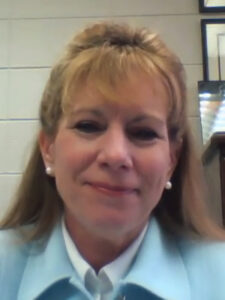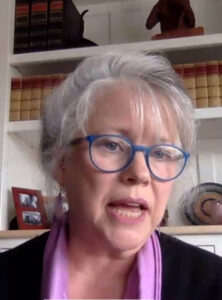MADISON – The University of Wisconsin System Board of Regents presented its annual Teaching Excellence Awards Thursday, honoring award recipients for both 2020 and 2021. The awards recognize outstanding teaching and are the UW System’s highest recognition for members of its faculty and instructional academic staff.
Last year’s awards ceremony was postponed due to COVID-19.
“These dedicated, gifted UW educators inspire students and colleagues alike,” said Regent Edmund Manydeeds III, chair of the selection committee. “We celebrate their creative approaches to teaching and learning, including their commendable adaptability to circumstances arising from the pandemic.”
- Dr. Hoepner
- Dr. Stewart
- Dr. Smock, chair of Radio TV Film
- Dr. Levintova
- Dr. Redman
- Dr. Pearson, faculty member of Nutrition Sciences/Dietetics
The 2020 recipients are:
- Jerry Hoepner, Department of Communication Sciences and Disorders, UW-Eau Claire
Dr. Hoepner told Regents that being surrounded by others who share a similar commitment to quality teaching and helping students is vital. “We are systematically evaluating our own teaching. We have daily conversations about teaching and research that always keeps us moving forward. It also helps to connect us with learners,” he said.
Hoepner said it’s also important to listen closely to students. “This helps us continuously hone our approach and meet the needs of a diverse student body,” he said.
- Richard Stewart, Transportation and Logistics Management, School of Business and Economics, UW-Superior
“The highest quality education requires ongoing, multi-level engagement to have students and faculty enlightened and excited about learning,” said Dr. Stewart. Faculty must be the role model in this, he added.
“Many of the most important outcomes of a quality education – self-confidence and an excitement about learning – are virtually impossible to quantify,” Stewart said, adding that recognizing the value of education often does not become apparent until later in life. “We must always practice continuous improvement,” he said.
- Department of Radio TV Film, UW Oshkosh
Department chair Dr. Andrew Smock, accepting the award on behalf of the department, told Regents what sets apart outstanding teaching isn’t a particular approach but “a passion for the discipline and truly caring for students.”
Outstanding teaching begins by designing a program with great intention, he said, and engaging students in opportunities beyond classroom borders. He said students in the Radio TV Film program are always aware they are producing for an audience, whether live, online, or otherwise. “Knowing they’re not just graded by professors but they’re being seen by those in the community and beyond pushes them. That push is good,” he said.
- See UW System news release: Regents announce outstanding UW System teachers for 2020
The 2021 recipients are:
- Ekaterina Levintova, Department of Democracy Studies, UW-Green Bay
Dr. Levintova told Regents she has “a smile when I enter my office every day.” She recalled the first convocation she attended at UW-Green Bay in 2007 where the motto was “Connecting learning to life.” She said that motto resonated with her over the years and continues to inspire her teaching.
“I want my students to be fulfilled and have rewarding careers that they love,” she said. “More than that, connecting learning to life inspires in students lifelong learning… to seek knowledge and rejoice in learning.” She said it’s also important to connect learning to students’ lives and identities outside campus.
- Renee Redman, Department of Biology, UW-La Crosse
As a teacher, Dr. Renee Redman said her main priority is that her “students feel comfortable asking questions.” She focuses on creating an inclusive environment where students feel safe and know that no one will cast judgment on their questions.
“Students have to believe you care and that you’re in their corner,” Redman said. Encouraging them to ask questions “empowers them to advocate for themselves, to stand up for themselves.” She also considers their questions a tool for lifelong learning as a teacher, as an opportunity to learn what she can do better.
- Nutrition Sciences/Dietetics Program, UW-Green Bay
Dr. Deb Pearson, accepting the award on behalf of the Nutrition Sciences/Dietetics program, said her colleagues are “united in our commitment and enjoyment in mentoring the personal and professional development of students. We want to help them develop knowledge and find meaningful, purposeful career paths.”
‘We head into class with passion and enthusiasm on our sleeve. And that genuine passion and enthusiasm is contagious,” she said. “When students get inspired, they are that much more willing to jump into academic rigor and develop curiosity.” She also noted how important it is to provide students with opportunities to translate their learning to real-life experience.
- See UW System news release: Regents announce outstanding UW System teachers for 2021
UW System seeks more coordinated online education efforts
Facing intense competition in online education, the UW System is planning more focused coordination of new and existing resources to capture more of the online education market.
“We have an opportunity to better serve adult learners in Wisconsin, but we have to be more aggressive and focused to serve these potential students and employers,” said UW System President Tommy Thompson.
The UW System has made improving online education a key focus of its 2021-23 budget proposal. It is seeking about $15 million to get started but would eventually be self-sustaining.
Anny Morrobel-Sosa, Vice President for Academic and Student Affairs, led a presentation on the framework for the UW System’s online education plans – including enhanced research and marketing, expanded program and curriculum development, and maximum flexibility to response to evolution in the marketplace. The framework, called Project Distance Education+ (Project DE+), is being developed through ongoing discussions with university and other stakeholders.
The effort will target the estimated 815,000 adults in Wisconsin with some college credit but no degree. According to 2017 U.S. Census survey data, about 300,00 of these 815,000 are actively seeking some form of higher education. Adult learners often identify online education as their preferred pathway.
“This is a once-in-a-generation opportunity,” Morrobel-Sosa said. “We need to be truly strategic in our thinking, especially given declining enrollments and revenue.”
- See UW System news release: UW System seeks to focus coordination of online education efforts
- See UW System PowerPoint: Project Distance Education (DE)+ The Renewed Wisconsin Idea & the Distance Education Opportunity
Morrobel-Sosa said Project DE+ requires addressing four priorities: investments in more rapid program development and a streamlined approval process; increased awareness of existing and new program development and enhanced marketing efforts; increased campus participation with increased program revenue as an incentive; and the unbundling of almost all elements.
“We have clear challenges to growing online programming. Scale actually matters, as well as the quantity and quality of programming delivered. We also need to do better market research analysis,” Morrobel-Sosa said.
UW System must also have greater speed-to-market in its programming in order to be responsive to demand and offer maximum flexibility to accommodate the different expectations of adult learners, Morrobel-Sosa said.
Regent Tracey Klein, chair of the Education Committee, acknowledged the challenges of a large organization coming together around Project DE+ without considerable debate. “But I don’t see us being able to do this on a campus-by-campus basis,” she said. “This has to be system. We ought to be able to figure out a model where we can collaborate.”
Noting his significant personal experience with online learning, Regent Corey Saffold told the Board, “I really, really like the direction this is going.”
“I believe we’re meeting the need of the consumer, and that’s what is really critical,” said Regent Eve Hall.
Calling Project DE+ a business case, Regent Scott Beightol said the University needs to go to the legislature on behalf of Project DE+ “speaking with one voice.” “We want this to happen. The citizens of this state need it to happen,” he said.
Regent Karen Walsh said Board members need to be prepared to consider “a staggering amount of money for marketing,” particularly given the aggressive competition. “We cannot go short on marketing or this will come to naught,” she said.
“We’re only going to get one shot at this,” Thompson said. “If we don’t start, we’re never going to get there. I want us to establish ourselves the best we possibly can. There has to be some money spent in a centralized fashion in order to compete.”
Further discussions with UW stakeholders and others about Project DE+ are expected to occur later this month.
In other business, the Board of Regents:
- Approved a clinical trial agreement for UW-Madison with Context Biopharma, Inc. and the Medical College of Wisconsin;
- Approved a contractual agreement between UW-Madison and Stanley Convergent Security Solutions, Inc. to replace the electronic door access system on campus;
- Approved revisions to RPD 13-4, “Institutional and Employee Relationships with Educational Loan Lenders;”
- Approved the rescission of RPD 4-15, “Excess Credit Policy except for UW-Madison;”
- Approved UW-Madison’s request to establish a Bachelor of Science in Environmental Engineering;
- Approved UW-Stout’s request to establish a Bachelor of Science in Arts Administration and Entrepreneurship (AA&E) that integrates the array of well-established Bachelor of Fine Arts and Business and Management programs;
- Approved UW-Madison’s request to Extend a Lease of Space for a Research Laboratory in the University Research Park;
- Approved UW-Madison’s three-part request to transfer ownership of the Department of Public Instruction (DPI) building to the Board of Regents and to construct two gift-funded projects to consolidate, co-locate, and strategically re-think space utilization across campus in accordance with the university’s master plan; Also approved UW-Madison’s request to construct the DoIT Digital Publishing & Printing Services Relocation project to move that unit from the Environmental Health and Safety Building to the former DPI building; and the Facilities Planning & Management, Physical Plant Relocation Project that relocates the Physical Plant shops, administrative staff, and other smaller business units from the Service Building and Service Annex Building to the 30 North Mills Street, 45 North Charter Street, and 30 East Campus Mall buildings;
- Approved UW System’s request to construct two Minor Facilities Renewal projects: Repair of exterior masonry, limestone, sandstone, and metal facade elements, and replacement of exterior windows, screens, and storm window units in Mitchell Hall at UW-Milwaukee; and repair of south entrances of McGraw Hall at UW-Whitewater and improved ADA accessibility connections;
- Approved UW System’s request to construct three All Agency Maintenance and Repair projects: Renovation of southwest area of the third floor of the UW-Milwaukee Golda Meir Library; structural repairs and waterproofing to the underground deteriorated utility tunnel from the central Heating Plant at UW Oshkosh; and implementation of four energy conservation measures at UW-Stevens Point based on a recently completed investment grade energy audit of 13 residence halls, the 601 Division Street building, and three gymnasiums in Marshfield Clinic Champions Hall;
- Approved amendment of Regent Policy Document 19-14, “Naming of University Facilities and Lands;”
- Withdrew a resolution to approve changes to a Board of Regents bylaw regarding Mode of Election; and
- Recognized the passing of Thomas Lyon, member of the UW System Board of Regents (1986–93), serving as Board President from 1990–92.
The University of Wisconsin System Board of Regents will next meet on June 3–4, 2021, hosted by UW-Milwaukee.

